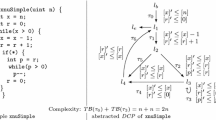Abstract
The convexity of numerical domains such as polyhedra, octagons, intervals and linear equalities enables tractable analysis of software for buffer overflows, null pointer dereferences and floating point errors. However, convexity also causes the analysis to fail in many common cases. Powerset extensions can remedy this shortcoming by considering disjunctions of predicates. Unfortunately, analysis using powerset domains can be exponentially more expensive as compared to analysis on the base domain. In this paper, we prove structural properties of fixed points computed in commonly used powerset extensions. We show that a fixed point computed on a powerset extension is also a fixed point in the base domain computed on an “elaboration” of the program’s CFG structure. Using this insight, we build analysis algorithms that approach path sensitive static analysis algorithms by performing the fixed point computation on the base domain while discovering an “elaboration” on the fly. Using restrictions on the nature of the elaborations, we design algorithms that scale polynomially in terms of the number of disjuncts. We have implemented a light-weight static analyzer for C programs with encouraging initial results.
Preview
Unable to display preview. Download preview PDF.
Similar content being viewed by others
References
Abramsky, S., Jung, A.: Domain theory. In: Handbook of Logic in Computer Science, ch. 1, vol. 3, pp. 1–168. Clarendon Press, UK (1994)
Bagnara, R., Hill, P.M., Zaffanella, E.: Widening operators for powerset domains. In: Steffen, B., Levi, G. (eds.) VMCAI 2004. LNCS, vol. 2937, pp. 135–148. Springer, Heidelberg (2004)
Bagnara, R., Ricci, E., Zaffanella, E., Hill, P.M.: Possibly Not Closed Convex Polyhedra and the Parma Polyhedra Library. In: Hermenegildo, M.V., Puebla, G. (eds.) SAS 2002. LNCS, vol. 2477, pp. 213–229. Springer, Heidelberg (2002)
Blanchet, B., Cousot, P., Cousot, R., Feret, J., Mauborgne, L., Miné, A., Monniaux, D., Rival, X.: A static analyzer for large safety-critical software. In: ACM SIGPLAN PLDI 2003, vol. 548030, pp. 196–207. ACM Press, New York (2003)
Clarisó, R., Cortadella, J.: The octahedron abstract domain. In: Giacobazzi, R. (ed.) SAS 2004. LNCS, vol. 3148, pp. 312–327. Springer, Heidelberg (2004)
Cousot, P., Cousot, R.: Static determination of dynamic properties of programs. In: Proc. Intl. Symp. on Programming, Dunod, pp. 106–130 (1976)
Cousot, P., Cousot, R.: Abstract Interpretation: A unified lattice model for static analysis of programs by construction or approximation of fixpoints. In: ACM Principles of Programming Languages, pp. 238–252 (1977)
Cousot, P., Cousot, R.: Systematic design of program analysis frameworks. In: Symposium on Principles of Programming Languages (POPL 1979), pp. 269–282. ACM Press, New York (1979)
Cousot, P., Cousot, R.: Comparing the Galois connection and widening/narrowing approaches to Abstract interpretation, invited paper. In: Bruynooghe, M., Wirsing, M. (eds.) PLILP 1992. LNCS, vol. 631, pp. 269–295. Springer, Heidelberg (1992)
Cousot, P., Halbwachs, N.: Automatic discovery of linear restraints among the variables of a program. In: ACM POPL, pp. 84–97 (January 1978)
Das, M., Lerner, S., Seigle, M.: ESP: Path-sensitive program verification in polynomial time. In: Proceedings of Programming Language Design and Implementation (PLDI 2002), pp. 57–68. ACM Press, New York (2002)
Dor, N., Rodeh, M., Sagiv, M.: CSSV: Towards a realistic tool for statically detecting all buffer overflows in C. In: Proc. PLDI 2003. ACM Press, New York (2003)
Floyd, R.W.: Assigning meanings to programs. Proc. Symposia in Applied Mathematics 19, 19–32 (1967)
Giacobazzi, R., Ranzato, F.: Optimal domains for disjunctive abstract intepretation. Sci. Comput. Program 32(1-3), 177–210 (1998)
Halbwachs, N., Proy, Y., Roumanoff, P.: Verification of real-time systems using linear relation analysis. Formal Methods in System Design 11, 157–185 (1997)
Handjieva, M., Tzolovski, S.: Refining static analyses by trace-based partitioning using control flow. In: Levi, G. (ed.) SAS 1998. LNCS, vol. 1503, pp. 200–214. Springer, Heidelberg (1998)
Hoare, C.A.R.: An axiomatic basis for computer programming. Commun. ACM 12(10), 576–580 (1969)
Ivančić, F., Gupta, A., Ganai, M.K., Kahlon, V., Wang, C., Yang, Z.: Model checking C programs using F-Soft. In: Etessami, K., Rajamani, S.K. (eds.) CAV 2005. LNCS, vol. 3576, pp. 301–306. Springer, Heidelberg (2005)
Karr, M.: Affine relationships among variables of a program. Acta Inf. 6, 133–151 (1976)
Manevich, R., Sagiv, M., Ramalingam, G., Field, J.: Partially disjunctive heap abstraction. In: Giacobazzi, R. (ed.) SAS 2004. LNCS, vol. 3148, pp. 265–279. Springer, Heidelberg (2004)
Mauborgne, L., Rival, X.: Trace partitioning in abstract interpretation based static analyzers. In: Sagiv, M. (ed.) ESOP 2005. LNCS, vol. 3444, pp. 5–20. Springer, Heidelberg (2005)
Rugina, R., Rinard, M.: Symbolic bounds analysis of pointers, array indices, and accessed memory regions. In: Proc. PLDI. ACM Press, New York (2000)
Sankaranarayanan, S., Colón, M.A., Sipma, H.B., Manna, Z.: Efficient strongly relational polyhedral analysis. In: Emerson, E.A., Namjoshi, K.S. (eds.) VMCAI 2006. LNCS, vol. 3855, pp. 111–125. Springer, Heidelberg (2005)
Sankaranarayanan, S., Sipma, H.B., Manna, Z.: Scalable analysis of linear systems using mathematical programming. In: Cousot, R. (ed.) VMCAI 2005. LNCS, vol. 3385, pp. 25–41. Springer, Heidelberg (2005)
Simon, A., King, A., Howe, J.M.: Two variables per linear inequality as an abstract domain. In: Leuschel, M.A. (ed.) LOPSTR 2002. LNCS, vol. 2664. Springer, Heidelberg (2003)
Wagner, D., Foster, J., Brewer, E., Aiken, A.: A first step towards automated detection of buffer overrun vulnerabilities. In: Proc. NDSS 2000, pp. 3–17. ACM Press, New York (2000)
Author information
Authors and Affiliations
Editor information
Editors and Affiliations
Rights and permissions
Copyright information
© 2006 Springer-Verlag Berlin Heidelberg
About this paper
Cite this paper
Sankaranarayanan, S., Ivančić, F., Shlyakhter, I., Gupta, A. (2006). Static Analysis in Disjunctive Numerical Domains. In: Yi, K. (eds) Static Analysis. SAS 2006. Lecture Notes in Computer Science, vol 4134. Springer, Berlin, Heidelberg. https://doi.org/10.1007/11823230_2
Download citation
DOI: https://doi.org/10.1007/11823230_2
Publisher Name: Springer, Berlin, Heidelberg
Print ISBN: 978-3-540-37756-6
Online ISBN: 978-3-540-37758-0
eBook Packages: Computer ScienceComputer Science (R0)




